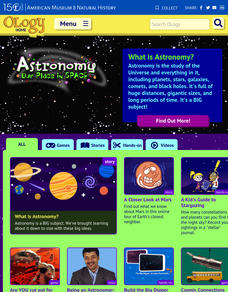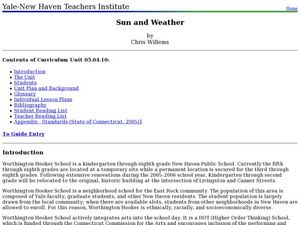Core Knowledge Foundation
Astronomy—Our Solar System and Beyond Tell It Again!™ Read-Aloud Anthology
A read-aloud anthology explores our solar system and beyond. Informational texts about astronomy invite pupils to discuss readings. Extension activities examine vocabulary, sayings, and phrases. Scholars work through the writing process...
NASA
Raisin Bread Universe
What is the universal breakfast? The resource includes two activities, the first one observing oatmeal to understand the texture of the universe. Then, scholars measure raisin bread dough before and after it rises to represent the...
Curated OER
GED Vocabulary: Earth and Space Science-Earth's Crust and The Solar System
In this earth and space science instructional activity, students complete a crossword puzzle given 9 clues and a word bank on topics such as sea floor spreading, tectonic plates, faults, lava and the big bang theory.
American Museum of Natural History
Planetary Mysteries
A website all about planetary mysteries—it's a one-stop-shop for all things, stars, planets, and space travel. Scholars read an astronomy overview to discover the page's big ideas, then choose from the plethora of resources, including...
American Museum of Natural History
What Do You Know About Astronomy
Develop an understanding of the universe. Learners answer 10 multiple choice questions about several topics in astronomy. Questions contain information about the age of the universe, gravitational attraction, galaxies, planets and comets...
NASA
Measuring Dark Energy
You're only 10 minutes late? Do you know how much the universe has expanded in those 10 minutes? Scholars graph supernovae based on their redshift and see if the results verify Hubble's Law. If it does confirm it, the universe is...
Curated OER
The Energy of Empty Space
In this energy in empty space activity, students use an equation for Cosmic Inflation to solve eight problems. They find the domain and range of the function of the equation, they determinethe axis of symmetry, they find the critical...
NASA
Melting Ice: Designing an Experiment
Sometimes, despite the best laid plans, the unexpected will occur. Learners witness this firsthand as they carefully design an experiment to determine the time needed for ice to melt in salt water or pure water. They uncover facts not...
Curated OER
Cosmology
In this space science worksheet, students find the words that are related to the study of cosmology and the answers are found at the bottom of the page.
Science 4 Inquiry
Expanding the Universe
When Einstein first heard the theory of the expanding universe, he dismissed it as bad physics. Now scholars learn about the theory and how scientists prove it has merit. Through a hands-on simulation and videos, class members measure...
Curated OER
The Vocabulary of Space
Students build their knowledge and understanding of vocabulary related to space. In this space lesson plan, students discuss four categories of words and phrases related to space.
Curated OER
The Sun in Our Lives
Third graders identify the different parts of the sun. In this astronomy lesson, 3rd graders examine how the sun's energy drive life processes on Earth. They construct a model of a solar system using large rolls of toilet paper.
Curated OER
The Universe
Students describe what scientists mean by an "expanding universe" in their own words. They explain how scientists comprehend the universie is expanding. Students comprehend the vast scale of the universe. They comprehend how theory...
Curated OER
Sun and Weather
How is the Earth's weather created? Middle schoolers will explain how the Sun's energy is transformed into different forms. They will perform mathematical calculations of volume, mass, and temperature. They they will explain the...
Curated OER
Gravity Gets You Down
Students investigate the force of gravity and how it effects different objects that are put into acceleration when applied the experiment of free falling. They drop different objects that have a variety of masses and some that cause air...
Curated OER
Thinking About Technology: What Is It? How Can It Help Us?
What is technology and how can it help us? Using a worksheet, students read a list and choose practical applications of scientific knowledge, brainstorm examples of home, school and hospital technology, graph answers in a pie chart, and...
Curated OER
Informational Reading: Electronics Are Made from Resources
In this comprehension instructional activity, learners read about the making of a computer: circuit boards, hard drives, monitors and plastic housings. Students then answer 3 multiples choice questions.
Curated OER
Technology has a Solution!
For this technology worksheet, students summarize four things they learned about technology and the environment. Students then write a report that outlines how technology is solving environmental issues.
Curated OER
A Look at the Life That Electronics Lead
In this comprehension worksheet, students fill in ways on a graphic organizer that people or companies can conserve energy, reduce waste or minimize the impact to the environment. Next, students solve 3 "environmental" math word problems.
Mocomi & Anibrain Digital Technologies
Mocomi: The Big Bang Theory Facts
Learn how the universe came into existence by exploring the Big Bang Theory.
CK-12 Foundation
Ck 12: Earth Science: Big Bang Study Guide
Review the science behind the Big Bang Theory of the origin of the universe.
Other
Open Learn Learning Space: The Big Bang
This unit examines the Big Bang Theory in detail. Learn about the three pieces of information that contribute to scientists belief in this theory.
NASA
Nasa: Space Place: What Is the Big Bang?
With exciting illustrations, NASA's Space Place explains the theory of the origin of the universe known as the Big Bang.
National Science Foundation
National Science Foundation: Astronomy and Space: Research Overview
Explore some of our most fundamental questions about space exploration with this research overview collected by scientists at the National Science Foundation. Additionally, experience deep space first-hand with telescope interactives.























